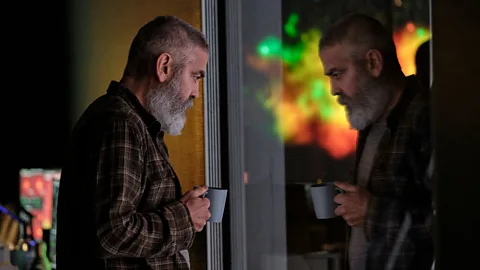Two stars for The Midnight Sky
 Netflix
NetflixGeorge Clooney directs and stars in a maudlin science-fiction drama that should be eerily prescient for 2020, but misses the mark, writes Nicholas Barber.
If you want a film to cheer you up after the trials and tribulations of 2020, The Midnight Sky isn't it. Directed by and starring George Clooney, this maudlin science-fiction drama begins with the news that the Earth is irradiated by an unspecified "Event" in the year 2049. Three weeks on, the radiation hasn't quite reached an observatory in the Arctic Circle, where Clooney's character, Augustine, is an astrophysicist. But all of his colleagues are desperate to reunite with their families while they still can, so they fly off, leaving him on his own amid the desolation. Oh – and did I mention that Augustine has a terminal illness? To sum up: everyone in the world is about to die of radiation poisoning, but one of them might die of something else first. Merry Christmas!
More like this:
Clooney's main concern, in the opening scenes, is to prove that he is no longer People Magazine's two-time winner of Sexiest Man Alive. Hollow-eyed, miserable and exhausted, he shuffles around the deserted observatory sporting a plaid shirt, a bushy grey beard, and a ragged crewcut: perhaps he has been using the electric clippers that he has been telling journalists about lately. We don't see any hair-cutting, though. Augustine doesn't do much at the observatory except self-medicating with alcohol, pills and blood transfusions, before collapsing by the toilet to be sick. (I can't the last sci-fi movie which was so preoccupied by vomit.) But then he discovers that he is not alone. A button-nosed little girl (Caoilinn Springall) in a yellow dress has been hiding in the observatory. She refuses to speak or write anything down, so he doesn't know who her parents are. To make matters even more inconvenient, Augustine's computer informs him that a spaceship is on its way back to Earth. Augustine wants to warn the astronauts that there is nowhere safe for them to land, but the antenna at his outpost isn't powerful enough, so he and the girl have to set off to another base across the snow.
The Midnight Sky should, in theory, be the perfect film for 2020. The novel it was adapted from, Good Morning, Midnight by Lily Brooks-Dalton, was published in 2016. But the premise is that the whole human race is endangered, small groups of people are trapped in their own bubbles, and everyone is obsessed by electronic communication. If the adaptation had been better, we would all be raving about how prescient it was. But, apart from a few touching scenes, it doesn't quite work. There is a vagueness to the film that makes it seem sketchy and artificial compared to what we have all experienced this year.
It's irritating enough that the exact nature of The Event is kept from us, and that the girl doesn't reveal her identity: both of these contrivances are past their sell-by date. But even aside from this fudging, the film skips over all the details that might have helped build tension and suspend disbelief. For instance, if we're supposed to be nervous about Augustine's hike to the other antenna, it would be useful to know how far away it is, and how many days it might take him to get there. And what about the spaceship? Its affable five-person crew, led by a twinkly captain (David Oyelowo) and a perky, pregnant communications officer (Felicity Jones), has been to see whether one of Jupiter's moons might be fit for human habitation. But how long have they been away, and what did they learn? We are given a protracted sequence in which the crew sings along to Neil Diamond's Sweet Caroline while repairing a radar, and another sequence in which an astronaut is repeatedly sick in zero gravity (I told you about the vomit). But we aren't given the information that might have let us believe in and care about what happens. The most distinctive aspect of the 2049 we're shown is that everyone uses 3D printers.
Instead of fashioning their own vivid world, Clooney and his team keep borrowing from other films, and invariably those films pack a greater emotional wallop. The screenplay is by Mark L Smith, who wrote The Revenant, but Clooney's trek through the wilderness is like a Sunday stroll in comparison to Leonardo DiCaprio's. At one point, Augustine falls through a sheet of ice into the Arctic water, swims around, and walks away unharmed. Not bad for a guy who could barely trudge along a corridor half an hour earlier. Meanwhile, the little crew of astronauts will remind viewers of Clooney's more fraught forays into space (Solaris, Gravity), as well as those undertaken by his Ocean’s Eleven buddies, Matt Damon (The Martian) and Brad Pitt (Ad Astra). But the crew in The Midnight Sky are so well groomed, smartly dressed and upbeat after several years away from Earth that they might as well be cosplaying at a Galaxy Quest convention.
To his credit, Clooney has made a bleaker film than most Hollywood A-listers and former Sexiest Men Alive would. He has tried to deal sincerely with the themes of isolation and choosing a career over a family. But if The Midnight Sky has the sombre tone of a high-minded art-house project, it has the bland design, sentimental characterisation and flimsy plotting of a children's TV movie. The story may have links with today's reality, but it never feels real.
★★☆☆☆
The Midnight Sky has a limited global cinematic release on 11 December, and is available on Netflix on 23 December.
Love film and TV? BBC Culture Film and TV Club on Facebook, a community for cinephiles all over the world.
